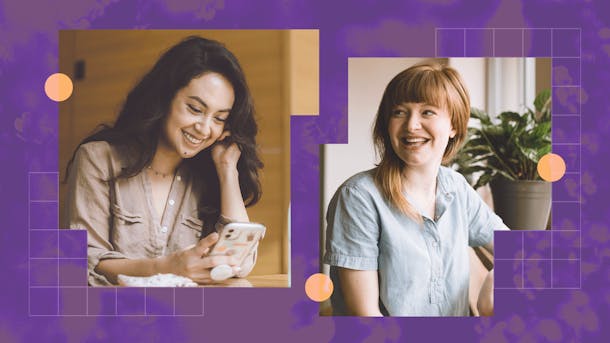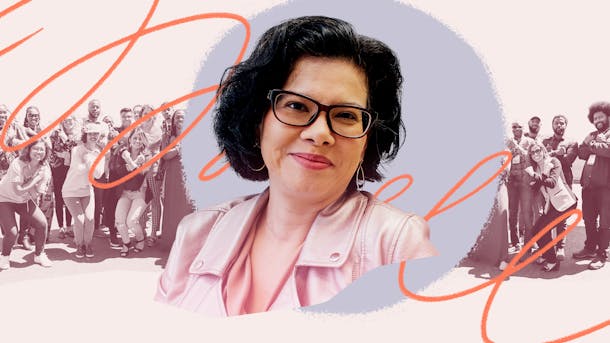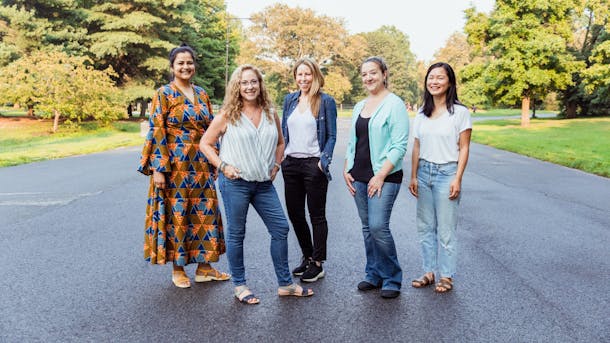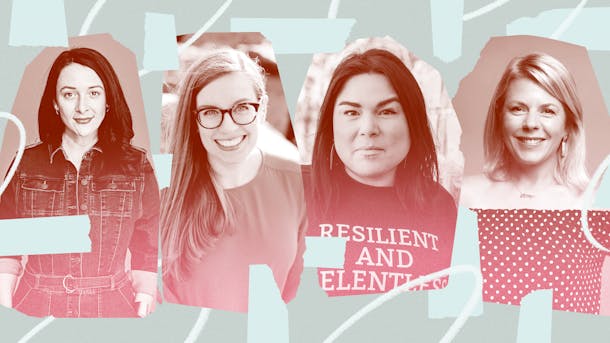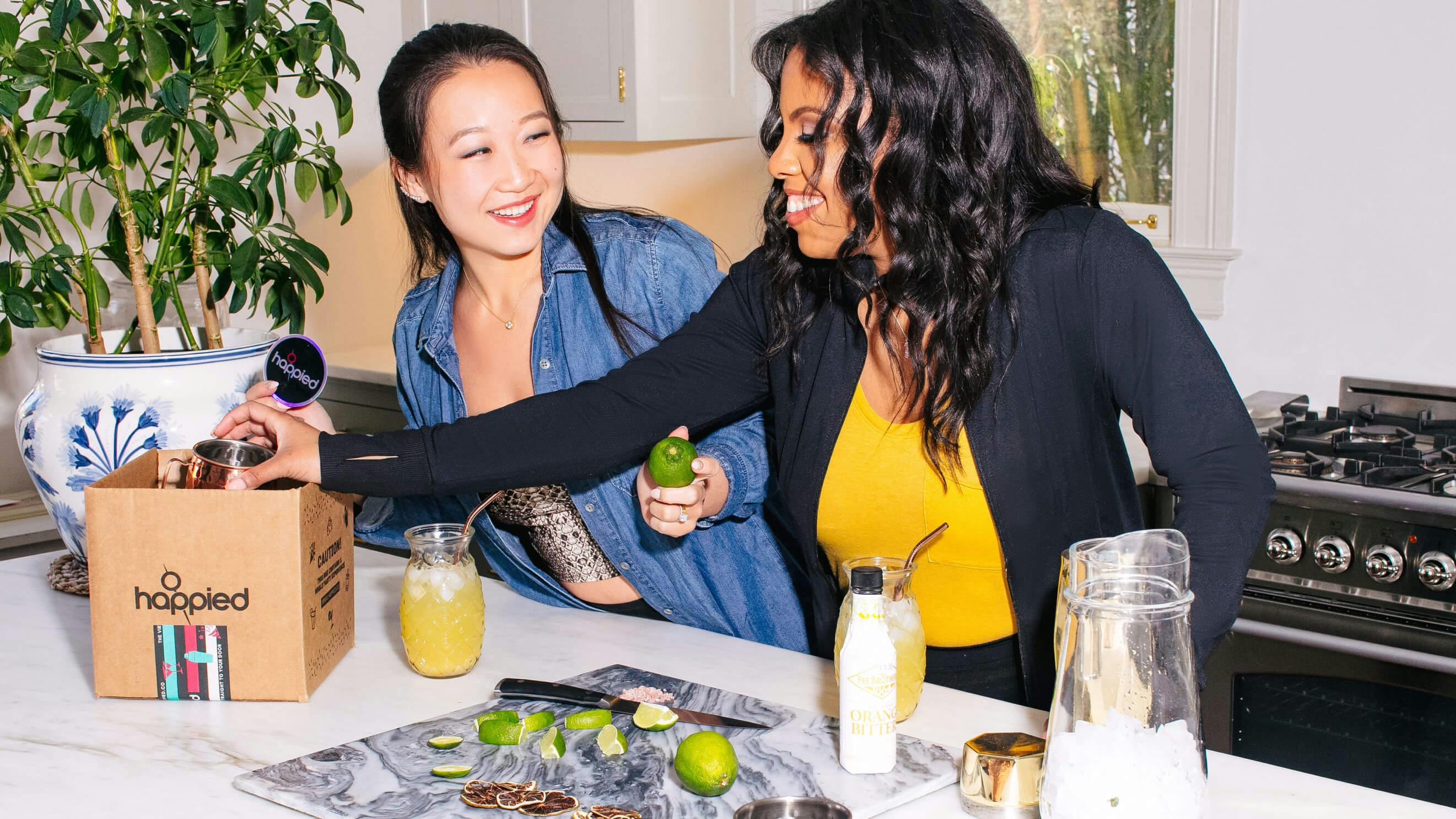
Feature Story
The pivots that grew and saved Happied’s business
April Johnson tells us how she and co-founder Sharon Cao pivoted their happy hour app to bring people together online during the pandemic — and created a sustainable business model in the process.
In March of 2020, April Johnson was working a few nights a week as a waitress at Thamee, a Burmese restaurant in Washington, D.C. As the threat of the COVID-19 pandemic became increasingly real, April wondered what that would mean for hospitality in the city.
“I remember going in for my shift on a Tuesday, and everyone was talking about the news coming out about COVID. When I left that night, I asked, ‘Are you sure I should come in on Thursday?’ Everyone thought it would be fine,” April said.
But a few days later, it became clear that things were not, in fact, fine. Restaurants and bars, in D.C. and across the country, were forced to close indefinitely as the virus spread.
For April, the hard-and-fast impact on the hospitality industry affected more than just her waitress job. One year earlier, having left her career as a corporate lawyer to follow her passion for food and drink, she and co-founder Sharon Cao had launched Happied, a search-and-discovery platform and mobile app for happy hours in D.C. proper.
After she was laid off from the waitress job and she and Sharon scrambled to respond to questions from app users, a new reality began to set in: Hospitality was about to take a major hit, as was Happied. If they wanted the company to survive the pandemic, they would need to consider a significant pivot.
Despite the dire outlook, April never considered shutting down the business. Instead, she and Sharon seized the moment to double-down on their mission to bring people together around food and drink.
How it all started: From personal passion to full-time gig
April’s passion for food and drink has deep roots — deep enough to drive and sustain her commitment to build a stronger company through the challenges of the pandemic.
In fact, April doesn’t remember a time she wasn’t enamored with everything to do with food and drink. “I didn’t grow up in a family of foodies, but from a really young age, I’ve always been very particular about the quality of food and about the overall experience of dining out,” April said. “I remember so clearly the joy I felt as a child when we went out to eat, and the way I would key into every aspect of the experience — from the servers to the food to how it was presented.”
That love for gathering around food and drink only grew as April left home and headed to college. “When I started going out to happy hours, I found my passion,” she said. “The fact that we could all get together for these great experiences and also save money was amazing. The community and vibe that is created at happy hours is so unique.”
And later, when she moved to D.C. to attend law school, she continued to hone her happy hour radar. April earned a reputation for being the go-to resource for friends and family looking for inside intel on the best happy hour deals and venues, and she prided herself on giving them customized, spot-on advice: “When people would ask me where to go, I would ask them what type of experience they were looking for,” she said, “because going out is about much more than the food — it’s about the ambience, the vibe, and the service.”
While working as a lawyer, she channeled her love for connecting people with great food and drink into a blog detailing her insights, which she named “Happied.”
Then, in 2017, April lost both her 31-year-old cousin and her aunt — a personal tragedy that inspired her to rethink her priorities.
“I had always wanted to do this, but in that moment of realizing how fragile life is, I thought, you know, life is short. I need to go for it,” April said. It was then that she decided to turn her passion into a full-time job.
I had always wanted to do this, but in that moment of realizing how fragile life is, I thought, life is short. I need to go for it.
Launching and learning set the stage
The following year, April left her legal career to devote all of her time to building Happied. She started working with a tech partner to transform her years of happy hour research and her existing blog into an interactive search platform, while continuing to build connections with bars and restaurants around D.C.
Soon after, Sharon, who was equally passionate about food and drink — and unfulfilled in her career as a consultant — sent April a direct message via Instagram, asking to join the team. Having spent years compiling a master spreadsheet of her food and drink finds in D.C. and sharing them with friends, Sharon was also ready to put her passion to work.
The two women connected immediately, Sharon committed full-time to her role as co-founder, and they officially launched the Happied app.
In the year that followed, the co-founders recognized the need to monetize the initially free app and pivoted to add a subscription option, partnering with local businesses to offer VIP-type perks for members. But while Happied was growing, ongoing technical issues were frustrating users and slowing adoption.
“There was a lot of learning going on in that phase, and a realization that we were doing a little bit too much too quickly,” April said. “We recognized that managing the app and the subscription piece — two separate business models — was going to continue to be a challenge, and we may need to pivot again.”
The co-founders parted ways with their original technical partner and began rethinking the platform.
The biggest and quickest pivot that saved Happied’s future
Sharon and April were in the middle of this period of transition when the pandemic hit, disrupting the entire hospitality industry — along with all other aspects of everyday life. For the co-founders, it also presented a potentially crushing business challenge: Nobody was going to any happy hours any time soon.
“It forced us to go in a completely different direction because everything we had built was suddenly useless,” April said. The fact that they were already considering changes to their business model primed the co-founders to embrace the necessary pivot. “Neither of us was prepared to go back to our day jobs,” April said. “We had built this community that we loved; now we just had to figure out how to make it work.”
Neither of us was prepared to go back to our day jobs. We had built this community that we loved; now we just had to figure out how to make it work.
They were able to find a way forward almost immediately — which speaks to the intentional effort they had already devoted to building relationships in hospitality around the city. When virtual events popped up in the early days of the shutdown, it was natural to turn to the Happied community of bars and restaurants for online events.
Just one week after restaurants closed, Happied partnered with D.C. restaurant Serenata to host its first online cocktail class. That first event, hosted via Zoom, in which April served as a host alongside the restaurant’s beverage director, was a hit.
Two more partnerships with area restaurants (also already part of the Happied community) followed in quick succession. Within a few weeks, restaurants and bars were seeking them out to host online events, eager to remain connected with their customers.
“That’s when we knew: This is what we want to do,” April said.
The transition to online events was a purposeful pivot, aligning directly with Happied’s mission in two significant ways. First, the virtual gatherings allowed them to continue to create community around food and drink for existing users and new customers. Second, by partnering with local bars and restaurants, they were able to provide a boost to the hospitality industry they both loved.
“Doing an event with Happied was a launching point for several restaurants we partnered with,” April said. “It was an epiphany — they realized patrons would come to these classes and would actually pay for the experience.”
Several of the businesses went on to develop their own series of online events, creating an ongoing source of engagement and revenue during the pandemic.
A focus on fun (and revenue) drives growth
The early period of Happied’s new, online offering became a valuable testing ground that allowed the co-founders to experiment, learn quickly, pivot, and develop differentiators for their product.
One key realization April and Sharon made early on was that they had to charge for Happied events. While free online events were popping up everywhere, April knew it would be important for people to literally “buy in” to the experience. “They need to be invested in building community,” she said.
While the co-founders were ideating around a more consistent revenue stream, April was working part-time at her former law firm to supplement her start-up income (or lack thereof). And, as remote work became the norm, she began receiving email invites for virtual happy hours from her firm.
After attending one or two of the online events, April quickly realized they were not the solution companies were hoping for to boost company morale in the new virtual landscape. “The consensus from everyone who went to these was that they were terrible. I thought: Why are they so bad? The events we do at Happied are so fun. There has to be a better way.”
Again, April and Sharon saw an opportunity to pivot. They started applying all they had learned through hosting their Happied cocktail classes to create a team-building and client engagement solution for companies — one that would be worthwhile (and actually fun) for everyone involved.
Equipped with a solid online event formula, which they could customize to suit companies’ unique needs, Happied hosted its first corporate event in June 2020 — for Google, no less.
Scaling sustainable, global success
With the product offering dialed in, April’s connection to law firms created an immediate market opportunity, and the business took off.
They kept the corporate event formula true to their original model — a host and a mixologist or culinary professional would guide the group through a fun, delicious experience — but added a new element in carefully curated cocktail or food kits, which were shipped ahead of time to each participant.
Each kit arrived as a gift box filled with high-quality ingredients, tools, bright confetti, and branding that delivered a party vibe and a preview of the fun ahead. The pairing of gift and live event, April said, “provided such a great element of surprise and delight, elevating the entire experience.”

Customers clearly agree. Since shipping the first kit in July 2020, which Sharon packed and shipped from her home, the company now ships, on average, 1,500 kits per month, assembled in a dedicated warehouse and shipped to clients all over the world.
The rise in the number of kits shipped reflects the equally big jump in the number of events. In the last year, Happied has gone from hosting three events per month to averaging 46 per month in August 2021.
From their first corporate event with Google, Happied has grown — primarily through word-of-mouth referrals — to serve over 80 customers, with a 34% repeat customer rate. “Our customers include Google, Yum Brands, American Express, Match.com, and dozens of top law firms,” April said. “We've worked with companies across the United States and have shipped kits internationally to South Africa, Singapore, Canada, Mexico, the U.K., and more.” The company is on track to bring in more than $1 million in revenue in 2021.
The early product offering has evolved from a focus on cocktails to now include classes for sushi, baking, and bubble tea, among others, intentionally spotlighting the skills and expertise of a diverse roster of hosts and hospitality professionals from around the country.
Through Happied, April and Sharon have been able to shine a light on underrepresented professionals in the industry. “As a Black woman CEO, it’s awesome to be in this space and highlight other people of color in the food and drink industry,” April said. “We take a lot of pride in elevating people who may not otherwise have had a shot. We train them for our platform, specifically, and they’re amazing.”

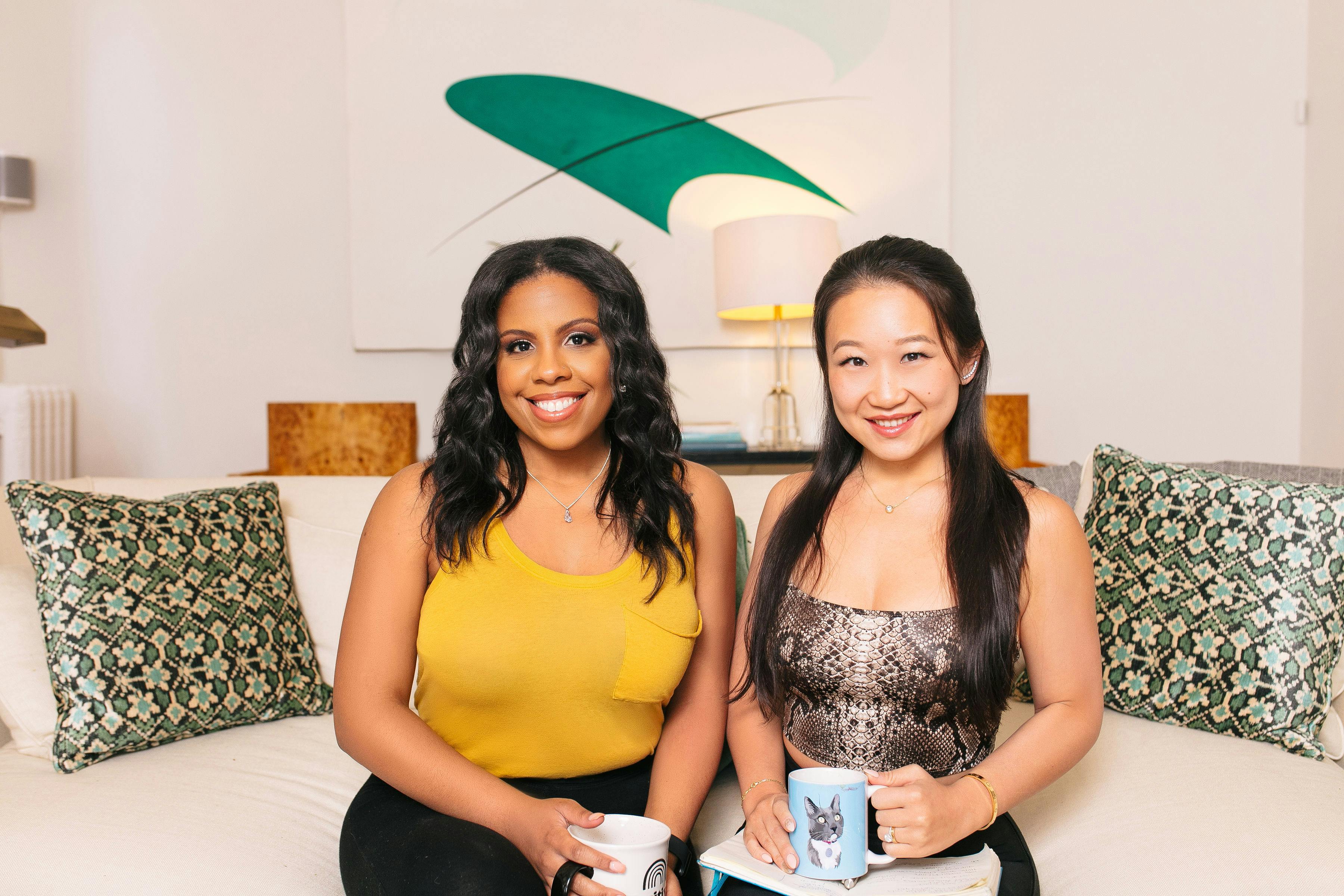

Fostering conversation and connection for the greater good
The co-founders’ commitment to diversity, inclusion, and social justice is also reflected in the “Solidarity Social Hours,” which they developed in the summer of 2020.
As the country grappled with the murders of George Floyd, Breonna Taylor, and countless other Black Americans, April and Sharon knew they could leverage their experience bringing people together online for the greater good.
“We asked ourselves, ‘What’s our role in this? How can we contribute in this moment and further raise awareness?’” April said.
When they saw their clients seeking out meaningful change and antiracism training within their organizations, April and Sharon tapped into their experience hosting corporate events for people from different backgrounds. “We realized we could create a space for conversation — for people to talk about the issues we were all confronting and learn from others.”
Happied launched “Solidarity Social Hours” to meet the moment — hosted events designed to create a space for guided conversation around racism and social justice, with the goal of encouraging micro-level change.
The work was incredibly meaningful, April said, and it remains an offering for corporate clients today. “It’s not meant to replace DEI training or macro-level organizational change, but it’s an opportunity to humanize people, to allow participants to understand another person’s perspective and to grow.”
Through growth and change, vision and mission remain
April’s original vision for Happied — creating joy around food and drink experiences — remains the consistent throughline of her work as a mission-driven founder at every turn.
“When we launched our first online public happy hours in the early days of the pandemic, we realized, ‘Wow, we’re bringing all these people together who may never have sat down next to each other at a bar or restaurant, and they’re forming friendships,’” April said. “We heard about people hanging out online again after those public events, and some have even connected in person now. That really showed us the power of online food and drink experiences to bring people together."
From the early days as a company of two, April and Sharon now serve as CEO and COO, respectively, leading a team of six full-time employees and 25 social hosts, chefs, and mixologists. “Building a team has been a really proud moment for me and for Happied,” April said. “To hire people who believe so much in your mission that they’re willing to work their butts off for you is really amazing.”
Building a team has been a really proud moment for me and for Happied. To hire people who believe so much in your mission that they’re willing to work their butts off for you is really amazing.
As the future of hospitality remains uncertain and the trend toward fully remote and hybrid corporate teams continues to gain traction, April sees continued market opportunity for Happied’s virtual model.
While April and Sharon are already considering options that would eventually accommodate in-person and remote employees, for now the goal is to continue refining fully online events and kits that connect, bring joy, and offer a shared experience.
April is also devoting time to fundraising, but she’s doing so with her mission — not plans for a big exit — guiding her path. “We’re really, really focused on quality, profit, and community, and we want to grow in a sustainable way that allows us to stay true to our mission,” she said. “We’re not interested in raising a ton of money and abandoning our vision, so we’re going to be very strategic in how we raise and how we scale.”
“We have the best job in the world,” April said, as she reflected on the mission that still inspires her each day. “It’s hard not to like what we do. Our job is to literally make people happy, and we get to do that every day. Seeing the impact of our product and our experiences on so many different people is the best outcome I could have imagined.”
